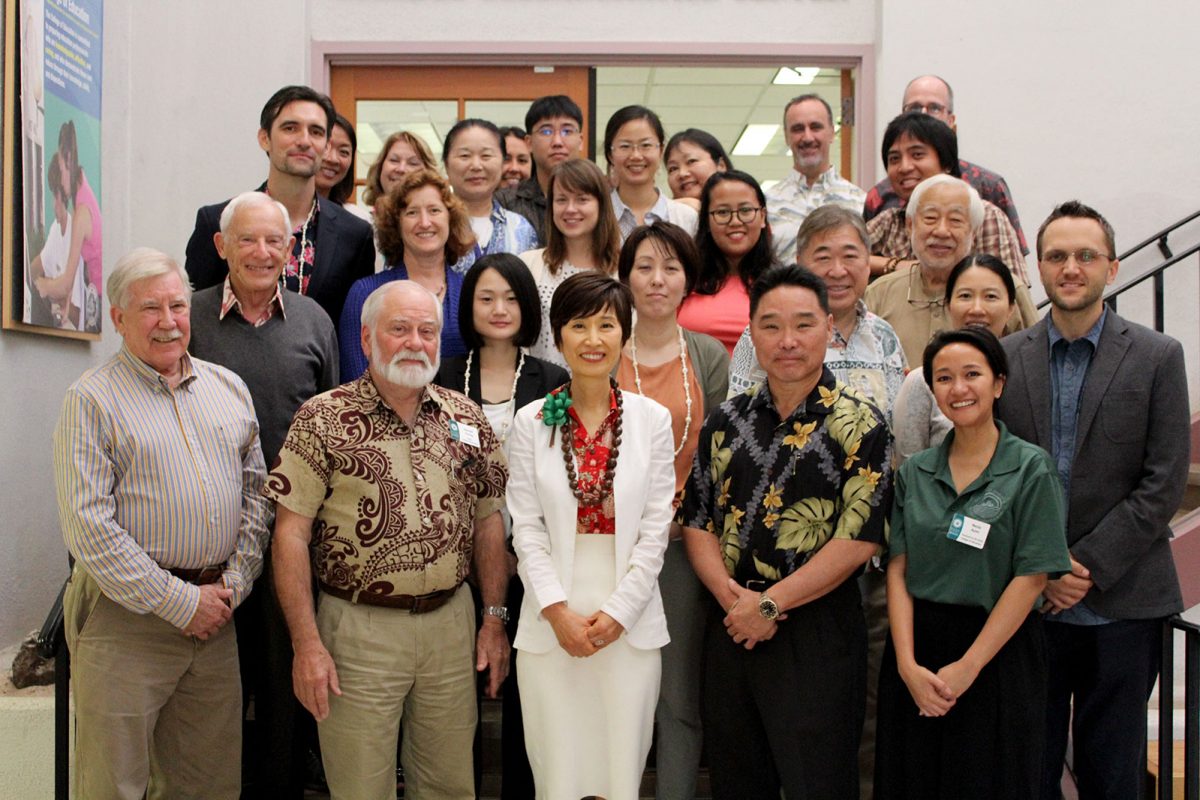PhD in Education
Education cannot be separated from deep planetary transformations in social orders, technology, politics, and ecology. Education also has the potential to open up new possibilities for living and reorganizing our relations to one another and the world. The PhD track in Foundations of Transformative Education builds capacities for educational leadership in relation to a range of urgent challenges including those stemming from contemporary struggles over land, wealth, knowledge, law, identity, culture, technology, democracy, and sustainability. The program is ideal for students and professionals seeking careers and advancement in schools, universities, non-profits, museums, community organizations, and other non-formal educational contexts.
Faculty and students in the Department of Educational Foundations develop intellectual and practical tools for practicing transformative education by drawing on foundational academic fields of history, sociology, and philosophy as well as interdisciplinary concepts, frameworks, and theories in the humanities and social sciences such as globalization and internationalization; critical theory; postcolonialism; feminism; cultural studies; Hawaiian and indigenous frameworks. By drawing on these perspectives and more, students build capacities for analyzing essential issues concerning how education–within and beyond institutions–is shaped by historical, sociocultural, technological, and political conditions. Students translate knowledge into practice for educational and social change at various scales, from the local to the planetary.
The faculty and courses in the PhD track in Transformative Education prepare students to think critically about the purposes of education and, in so doing, draw attention to the potential of education for social transformation. Students are trained to assess and think deeply about educational practices, pedagogies, and policies and how they are shaped by inequalities and conflicts over knowledge and worldview. Critical questions include: Whose perspectives shape educational policy and practice? How do different histories, discourses, and ideologies in education benefit or disadvantage different individuals and groups across class, race, nationality, ethnicity, gender, sexuality, and ability? What are the implications of different perspectives for equality, sustainability, democracy, and the future? And how do we conceive ethical practice when different perspectives are seemingly irreconcilable? Engaging with such questions has always been essential and has become even more vital in this era, where a variety of narratives and agendas compete for influence in an attempt to shape education at every level from classroom pedagogy, to school leadership practices, to system policies and beyond.
Virtual Information Sessions
Join us for sessions on 10/16/23, 11/13/23, 1/22/24, or 2/19/24 at 3-4pm. A recording will be posted for those who missed the session!
View Announcement
Who should consider this program
The PhD in Transformative Education serves a range of professionals who work, or who seek to work, in schools, universities, non-profits, and other non-formal educational contexts. The program provides an excellent foundation for those students who wish to pursue an academic track and graduates have gone on to hold academic positions. It also serves those working in higher education administration that wish to pursue opportunities for advancement. Teachers, school leaders, analysts, and those working in community organizations, non-governmental organizations, informal education, adult education, and in state education agencies also find great value in this program to develop tools for professional practice and career advancement. Moreover, graduates from the program are prepared to work within and across these sectors.
Common Careers Pathways
Graduates of Foundations in Transformative Education use their degree for career advancement in multiple ways. Teachers pursue this doctoral degree to inform their practice at the community, school, and classroom levels, while others benefit professionally from this degree because it can enable career transitions to positions of leadership within school systems, universities, or in other education organizations. This degree is also valuable for preparing candidates for doctoral study in education and academic employment. Given the broadly applicable nature of the courses in this master’s program, there are many possibilities. This degree prepares you for teaching positions in K-12 education and community colleges, for advocacy positions and program officer positions with community organizations, for policy-related functions in schools and school systems, and for employment in various governmental and non-governmental agencies.
Admission Requirements
-
Applicants must have graduated, or will graduate, from a UHM recognized,
accredited, master’s degree program prior to beginning the PhD, Education: Educational Foundations program.
-
A transcript from each post-secondary institution attended.
-
A written statement of objectives as part of your application.
-
Your resumé or CV.
-
A sample of scholarly writing as part of your application.
-
Three (3) letters of recommendation
-
Applicants who are not native English speakers may need to take the TOEFL or IELTS (Academic) tests.
For more information view the Graduate Division website.
-
International students that have been admitted are required to submit a copy of their Identification documents (i.e. Passport or Identification Card)
-
International applicants need to show proof of sufficient funding to cover all educational and living expenses
How to Apply
Tuition & Funding
Graduate Assistantships (GAs) are available to EDEF graduate students pursuing full time master’s or doctoral work. GA receives a 100% tuition exemption, a stipend, and health benefits. Effective August 1, 2023 (Mānoa), the stipend for a GA hired at Step 10 ($20,472 for 9 months and $23,952 for 11 months).
A GA is a renewable, part-time academic appointment. In addition to carrying out their assignments in their unit of hire, GAs also have roles as professionals, albeit of an apprentice nature, in the university community. While EDEF cannot guarantee a GA for each student upon admission. Students who wish to receive a GA are typically able to do so.
Tuition for the Graduate General & Post-Baccalaureate Unclassified program for the Fall 2023 semester:
- $1,101/credit – Resident ($650 tuition + $451 fees)
- $1,853/credit – Non-resident ($1,402 tuition + $451 fees)
Note: 8 credits is full time, most courses are 3 credits
There are many resources available to help graduate students pay for college, including College of Education scholarships. There are also several scholarships listed generally through the STAR website (please note that this is only accessible to students with a valid UH ID number – must be admitted as a student prior to looking for scholarships on this site) and the Financial Support section of the Graduate Division website. For more information on financial aid and additional resources, please visit the UH Manoa Financial Aid Office (finaid@hawaii.edu).
It should also be noted that many full-time students are able to find graduate assistant positions across the university. These positions come with tuition remission, a stipend, and health insurance.
Coursework
Coursework (40 Credits)
Departmental Core (12 Credits)
Education in a Changing World (3 Credits)
- EDEF 669 Intro to Comparative and International Education
- EDEF 684 Education and World Order
- EDEF 686 Environmental Education
- EDEF 725 Education and Social Change
Politics, Law, and Leadership (3 Credits)
- EDEF 680 Race, Law, and Education
- EDEF 667 (C) Leadership and Governance in Education
- EDEF 676 The Politics of Education
Sociocultural Studies in Education (3 Credits)
- EDEF 683 Social and Cultural Contexts of Education
- EDEF 630 Cultural Diversity
- EDEF 762 Seminar on Social and Cultural Contexts of Education
Philosophical and Theoretical Foundations (3 Credits)
- EDEF 610 Foundations of Educational Theory
- EDEF 660 Philosophy of Education
- EDEF 764 Seminar in the Philosophy of Education
Seminar Requirement (3 Credits)
- EDEF 762 Seminar on Social and Cultural Contexts of Education
- EDEF 764 Seminar in the Philosophy of Education
- EDEF 767 Seminar on the Educational System
- EDEF 725 Education and Social Change
College PhD Core = 12 credits
- Multiple Perspectives
- Qualitative Methods
- Quantitative Methods
- Advanced Methods
Additional Coursework
- Area of Emphasis = 9-12 credits
- Field Study or Internship: EDUC 740 or EDUC 799 = 3 credits
- Dissertation credits: EDEF 800 = 1+ credits



